|
|
|
Sort Order |
|
|
|
Items / Page
|
|
|
|
|
|
|
| Srl | Item |
| 1 |
ID:
152386
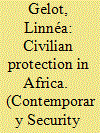

|
|
|
|
|
| Summary/Abstract |
This article explores how the protection of civilians is being militarized by African policymakers and diplomats. I draw on practice approaches to analyze what social groups are doing when they claim to “protect civilians.” I show how innovative protection mechanisms can be seen as a function of officials and diplomats coping with the changing circumstances of increasingly militarized politics in Africa. Specifically, accountability mechanisms for unintended and intended civilian harm by African security operations have originated in connection with this development. I argue that these are results of anchoring practices, which means that everyday informal interactions in one context become linked to another context. I argue that these emerging accountability mechanisms represent a new combination of practices, with the potential of changing the routine activities and mutual learning between policymakers and diplomats.
|
|
|
|
|
|
|
|
|
|
|
|
|
|
|
|
| 2 |
ID:
152378
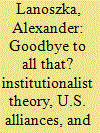

|
|
|
|
|
| Summary/Abstract |
In an important and stimulating article, Stephan Frühling and Andrew O’Neil argue in favor of applying institutionalist theory to understand the alliance politics of U.S. nuclear weapons strategy. But what promise does institutionalist theory really hold in thinking about highly unequal alliances nested in their particular threat environments? I argue that much work remains to be done to determine how much better institutionalist variables explain intra-alliance dynamics over alternative arguments that emphasize power and interests. Balances of power and the nature of threat environments may already account for key aspects of extended deterrent relationships supported by the United States in Europe and Asia. Ironically, the implication of this more traditional interpretation of alliances is that more continuity than change will characterize how Donald Trump will manage U.S. security relationships as President.
|
|
|
|
|
|
|
|
|
|
|
|
|
|
|
|
| 3 |
ID:
152377
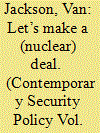

|
|
|
|
|
| Summary/Abstract |
An institutional perspective on nuclear deterrence cooperation within alliances has the potential to fundamentally reorient how we think about analyzing nuclear and deterrence decision-making between nuclear patrons and non-nuclear clients. It comes at a time when the presidency of Donald Trump is sure to test many of the core claims and assumptions in security studies, especially relating to bargaining and credibility within alliances. This article surveys questions that will be core to the research agenda involving alliance institutions and nuclear weapons during the Trump presidency and beyond.
|
|
|
|
|
|
|
|
|
|
|
|
|
|
|
|
| 4 |
ID:
152382
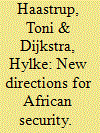

|
|
|
|
|
| Summary/Abstract |
African security, particularly conflict-related political violence, is a key concern in international relations. This forum seeks to advance existing research agendas by addressing four key themes: domestic politics and peacekeeping; security sector reform programs; peace enforcement; and the protection of civilians. Each of the articles in this forum makes a case for analyzing African agency when it comes to African security. As a way of introduction, this short article sets out the main debates and concludes by providing further directions for future research.
|
|
|
|
|
|
|
|
|
|
|
|
|
|
|
|
| 5 |
ID:
152380


|
|
|
|
|
| Summary/Abstract |
During the 2016 American presidential campaign, Democrats and Republicans alike repeatedly raised concerns at the prospect of Donald Trump being in charge of America’s nuclear arsenal based on his seemingly unstable personality. Unfortunately, this emphasis on Trump’s character distracted attention from any in-depth investigation into his long-standing interest in nuclear issues. This article seeks to remedy this shortcoming by highlighting the nuclear legacy Trump will inherit from Obama, surveying his statements on nuclear issues over more than three decades, and providing an analysis of constraining factors on his administration’s nuclear agenda, particularly domestic institutions. It finds that most of Trump’s views on nuclear issues are relatively consistent with past Republican presidents. Where he is unique, however, is in his use of social media, which has potential implications on nuclear signaling.
|
|
|
|
|
|
|
|
|
|
|
|
|
|
|
|
| 6 |
ID:
152379


|
|
|
|
|
| Summary/Abstract |
The swearing in of Donald Trump as the 45th President of the United States presages, at the very least, a period of flux in American strategy with respect to the relationship between nuclear weapons and alliances. In this response to three thoughtful rejoinders to our article, “Nuclear weapons, the United States and alliances in Europe and Asia: Toward an institutional perspective,” we clarify key aspects of our argument and discuss why alliance institutions are likely to be relatively robust in the face of change, how they can influence national decision-making, and argue that they may exert a moderating influence over the new administration.
|
|
|
|
|
|
|
|
|
|
|
|
|
|
|
|
| 7 |
ID:
152375


|
|
|
|
|
| Summary/Abstract |
America’s alliances in Europe and East Asia all involve some institutional cooperation on U.S. nuclear weapons policy, planning or employment—from consultative fora in Asia to joint policy and sharing of nuclear warheads in NATO. Such cooperation is often analyzed through the prism of “extended nuclear deterrence,” which focuses on the extension of U.S. security guarantees and their effect on potential adversaries. This article argues that this underplays the importance of institutional factors: Allies have historically addressed a range of objectives through such cooperation, which has helped to catalyze agreements about broader alliance strategy. The varied form such cooperation takes in different alliances also flows from the respective bargaining power of allies and the relative importance of consensus, rather than perceived threats. The article concludes that nuclear weapons cooperation will remain crucial in successful U.S. alliance management, as allies negotiate their relationship with each other in the face of geostrategic change.
|
|
|
|
|
|
|
|
|
|
|
|
|
|
|
|
| 8 |
ID:
152385
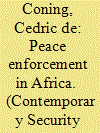

|
|
|
|
|
| Summary/Abstract |
When the United Nations (UN) Security Council needs to authorize a peace enforcement operation in Africa, its partner of choice is the African Union (AU). Africa has developed significant peace operations capacity over the past decade. In addition to deploying eight AU operations, Africa now contributes 50% of all UN peacekeepers. African stability operations, like its mission in Somalia, are often described as peace enforcement operations. In this article, I question whether it is accurate to categorize African stability operations as peace enforcement? I answer the question by considering what the criteria are that are used to differentiate between peace enforcement and peacekeeping operations in the UN context. I then use the peace enforcement criteria to assess whether AU stabilization operations would qualify as peace enforcement operations. In conclusion, I consider the implications of the findings for the strategic partnership between the AU and the UN.
|
|
|
|
|
|
|
|
|
|
|
|
|
|
|
|
| 9 |
ID:
152381


|
|
|
|
|
| Summary/Abstract |
India’s nuclear doctrine and posture has traditionally been shaped by minimum deterrence logic. This logic includes assumptions that possession of only a small retaliatory nuclear force generates sufficient deterrent effect against adversaries, and accordingly that development of limited nuclear warfighting concepts and platforms are unnecessary for national security. The recent emergence of Pakistan’s Nasr tactical nuclear missile platform has generated pressures on Indian minimum deterrence. This article analyzes Indian official and strategic elite responses to the Nasr challenge, including policy recommendations and attendant implications. It argues that India should continue to adhere to minimum deterrence, which serves as the most appropriate concept for Indian nuclear policy and best supports broader foreign and security policy objectives. However, the form through which Indian minimum deterrence is delivered must be rethought in light of this new stage of regional nuclear competition.
|
|
|
|
|
|
|
|
|
|
|
|
|
|
|
|
| 10 |
ID:
152383
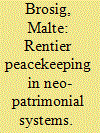

|
|
|
|
|
| Summary/Abstract |
International peacekeeping in Africa has developed dynamically in the last decade. The majority of global missions are deployed to the continent, the largest regional contingent of troops comes from Africa, and the African Peace and Security Architecture has made significant progress. Peacekeeping is Africanized today more than at any time before. However, mainstream research has insufficiently paid attention to African agency in this context. This article sheds light on the often neglected influence of African politics on international peacekeeping missions. The focus is set on the consequences of neo-patrimonial political systems, which can use international peacekeeping missions as an opportunity to generate rents. It will be shown that such a rent-seeking approach is highly problematic for the troop-contributing as well as mission-hosting countries. Instead of curbing conflict, rentier peacekeeping is prolonging and exporting it. The empirical examples used are the Burundian and Kenyan involvement in peacekeeping in Somalia.
|
|
|
|
|
|
|
|
|
|
|
|
|
|
|
|
| 11 |
ID:
152376
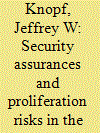

|
|
|
|
|
| Summary/Abstract |
Comments that Donald Trump made while campaigning to be U.S. president have raised concerns that his administration will pull back from U.S. alliance commitments and encourage countries such as Japan and South Korea to acquire nuclear arms. The new article by Frühling and O’Neil outlines an institutional framework that can be helpful in assessing the risks that Trump administration policies will lead to nuclear proliferation. An institutional perspective shows that important elements of U.S. security assurances will continue to function, and this reduces the chances that President Trump’s actions or statements will trigger proliferation by U.S. allies. The greatest risk to global non-proliferation efforts posed by a Trump administration in fact lies elsewhere, in the possibility that President Trump will seek to abrogate the Iran nuclear deal.
|
|
|
|
|
|
|
|
|
|
|
|
|
|
|
|
| 12 |
ID:
152384
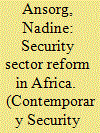

|
|
|
|
|
| Summary/Abstract |
Many African states have security sector reform (SSR) programs. These are often internationally funded. But how do such programs account for previously existing security institutions and the security needs of local communities? This article examines SSR all over Africa to assess local ownership and path dependency from a New Institutionalist perspective. It finds that SSR, particularly in post-conflict countries, tends to be driven by ideas and perceptions of international donors promoting generalized blueprints. Often, such programs only account in a very limited way for path-dependent aspects of security institutions or the local context. Hence, the reforms often lack local participation and are thus not accepted by the local community eventually.
|
|
|
|
|
|
|
|
|
|
|
|
|
|
|
|
|
|
|
|
|